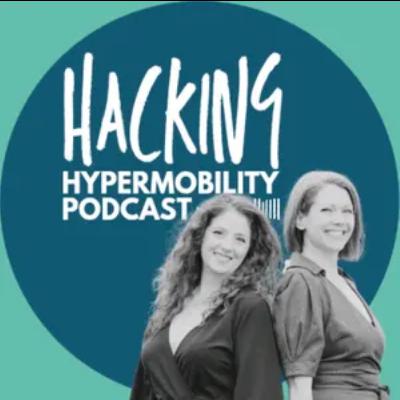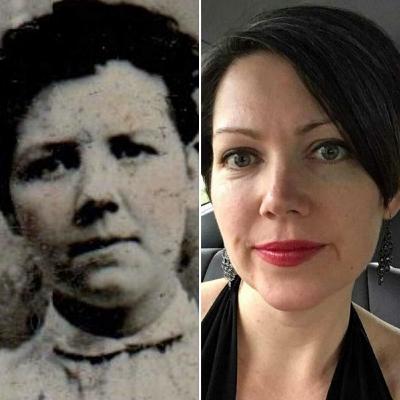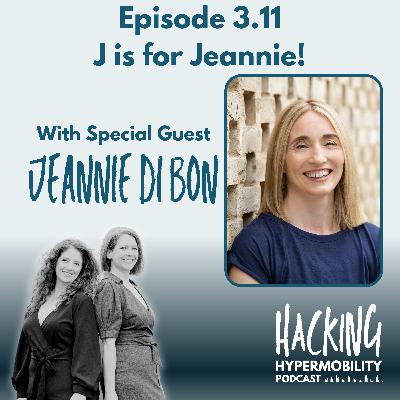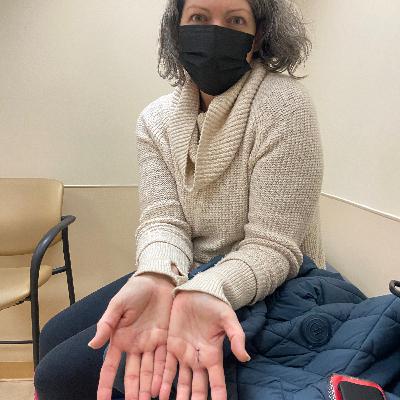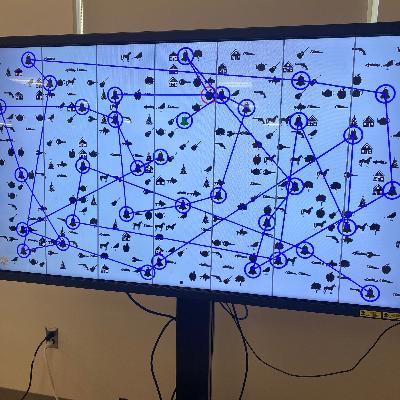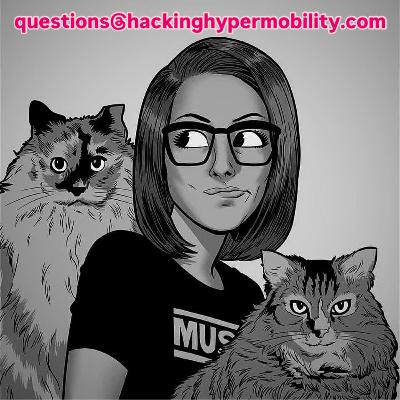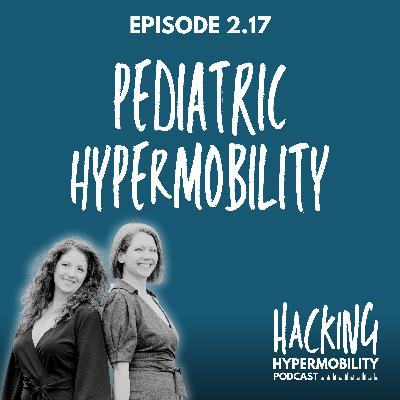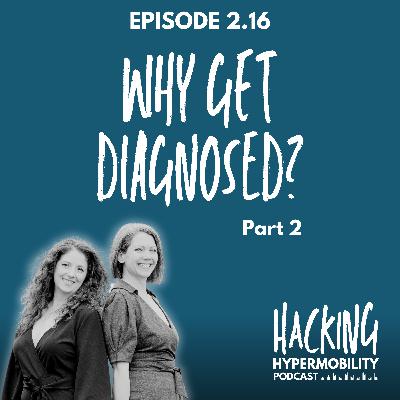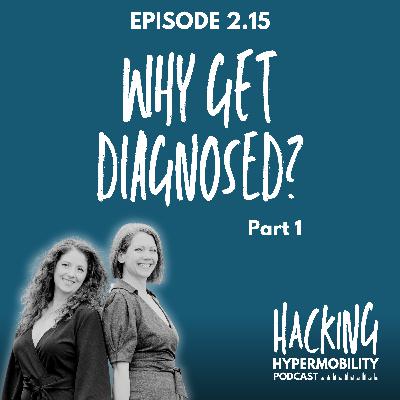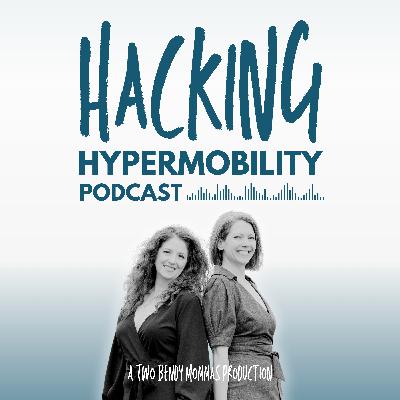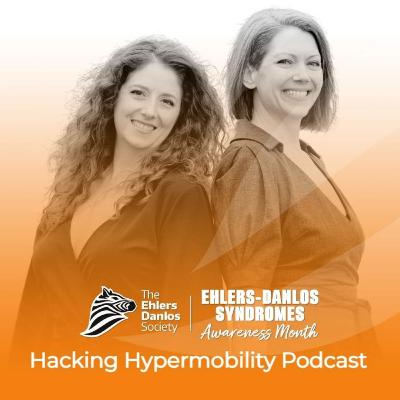Discover Hacking Hypermobility
Hacking Hypermobility

Hacking Hypermobility
Author: Two Bendy Mommas
Subscribed: 14Played: 131Subscribe
Share
© Two Bendy Mommas
Description
Hi! We’re Luna and Shelli, also known as The Two Bendy Mommas. We talk about the lived experience of those affected by the inherited connective tissue disorders, and its intersection with neurodiversity, elevating marginalized and intersectional voices for our community.
Please note: Hacking Hypermobility is produced in its entirety by three disabled women in various stages of life and parenting adventures. New episodes are typically released biweekly from January through July.
Please note: Hacking Hypermobility is produced in its entirety by three disabled women in various stages of life and parenting adventures. New episodes are typically released biweekly from January through July.
43 Episodes
Reverse
Notes are coming!
SummaryIt's our Third Birthday! Yay! Celebrate by taking a quick look back at some unseen footage from July 2022.Later in the episode, Luna and Shelli continue their conversation with Dr. Tina Wang. Keywordshypermobility, Ehlers-Danlos syndrome, community support, advocacy, personal stories, awareness, medical care, mental health, holistic approaches, podcastingTakeawaysCommunity support is crucial for individuals with hypermobility.Personal stories can help others feel less alone in their struggles.Advocacy and awareness are essential for improving care for hypermobility disorders.The importance of holistic approaches in managing health conditions.Sharing experiences can lead to greater understanding and empathy.Elevating marginalized voices is a priority in the hypermobility community.The podcast aims to bring diverse perspectives to the forefront.Emotional health is intertwined with physical health in managing hypermobility.Future goals include expanding outreach and resources for the community.The journey of understanding and managing hypermobility is ongoing and requires collaboration.
SummaryIn this episode, Luna and Shelli interview Dr. Tina Wang, a leading expert in fascia and hypermobility disorders. They discuss the importance of fascia in the body, its role in conditions like Ehlers-Danlos Syndrome, and the challenges faced in diagnosing and treating these disorders. Dr. Wang shares insights from her research, the significance of holistic care, and the need for better education and advocacy in the medical community. The conversation also touches on innovative treatment options and the upcoming Fascia Research Congress, highlighting the importance of collaboration in advancing the understanding of fascia and its impact on health.~~~~"Fascia is a system that permeates every organ.""Fascia is crucial to all our metabolic processes.""We are spiritual beings in a physical body."Keywordsfascia, hypermobility, Ehlers-Danlos Syndrome, pain management, holistic health, proprioception, fascia research, chronic pain, treatment options, patient advocacyTakeawaysFascia is a crucial system that permeates every organ in the body.Hypermobility is common in dancers and musicians, leading to unique challenges.The treatment outcomes for myofascial pain are often unsatisfactory.Patients need to learn how to manage their healthcare providers effectively.Fascia plays a significant role in metabolic processes and overall health.There is a need for clear diagnostic standards for hypermobility disorders.Every patient requires an individualized treatment approach.Many individuals with hypermobility are also highly sensitive and intuitive.The Fascia Research Society is actively seeking collaborators for research.Holistic care is essential for managing complex conditions like EDS.
Keywordshypermobility, EDS, Integral Movement Method, Zebra Club, chronic pain, movement therapy, nervous system regulation, healthcare education, community support, patient advocacySummaryIn this episode of the Hacking Hypermobility, Luna and Shelli chat with Jeannie Di Bon, a movement therapist and founder of The Zebra Club. They discuss the challenges faced by individuals with Ehlers-Danlos Syndrome (EDS) and hypermobility, including personal experiences with diagnosis, the importance of community support, and the Integral Movement Method (IMM) developed by Jeannie. The conversation emphasizes the need for better education among healthcare providers, the significance of nervous system regulation, and the role of the Zebra Club app in providing resources and support for the hypermobile community.Full show notes available here.TakeawaysJeannie Di Bon developed the IMM to help those with EDS and chronic pain.The Zebra Club app offers community, movement classes, and educational resources.Nervous system regulation is crucial before engaging in physical activity.Personal experiences with diagnosis can shape professional practices.The importance of individualized approaches in movement therapy for hypermobile patients.Community support is vital for those living with chronic conditions.Education for healthcare providers about EDS is lacking and needs improvement.Gentle, gradual movement is more effective than high-intensity workouts for hypermobile individuals.The IMM is evidence-based and focuses on integrating movement with mindfulness.Awareness and advocacy for EDS and hypermobility are essential for improving patient care.Resources & LinksFull Show Notes Available Here!Jeannie's Website: https://jeanniedibon.comThe Zebra Club App: https://www.thezebra.clubGet Jeannie's Book, Hypermobility Without TearsBookshop.orgAmazon (US)Amazon (UK)
Shelli explores the personal experiences of multiple surgeries, focusing on the scheduling, preparation, recovery, and interactions with healthcare professionals.Shelli also shares insights into the challenges faced during the surgical process, including anesthesia, pain management, and the importance of patient advocacy in navigating medical care.Tiffany shares some exciting news for mid-atlantic zebras Luna is the jokester in this episode!Keywordssurgery, recovery, anesthesia, patient experience, healthcare, hand surgery, hip surgery, medical interactions, patient advocacy, health managementTakeawaysSurgery scheduling can be influenced by personal circumstances.Experiences with different types of surgeries can vary significantly.Preparation for surgery includes managing anxiety and ensuring hydration.Post-surgery recovery involves pain management and mobility exercises.Follow-up care is crucial for monitoring healing and addressing complications.Interactions with healthcare professionals can impact the overall experience.Patient advocacy is essential in ensuring proper care and communication.The importance of personal comfort items during surgery, like grippy socks.Understanding the role of anesthesia in the surgical process is vital.Ongoing challenges can arise even after successful surgeries. LinksUVA EDS Clinic Press Release - https://news.med.virginia.edu/clinical/uva-health-launching-comprehensive-national-program-for-connective-tissue-disorders/
In this episode, Tiffany warns about having surgery on both hands on the same day.
Does anyone actually read these descriptions? If you're reading this, not on podcast staff, and have the spoons, leave us a review or comment and tell us about this silly episode description!
Oopsie!Shelli's YouTube
Keywordsbrain, dysautonomia, executive functioning, personal journey, daily challenges
If you are able, Shelli recommends watching this episodeSummaryIn this episode, Luna discusses a groundbreaking study linking joint hypermobility and anxiety, highlighting the neurological underpinnings of these conditions. Shelli discusses aEDS, hip dysplasia, and shares more candid content from sessions with her physical therapist.Keywordshypermobility, anxiety, medical gaslighting, Ehlers-Danlos syndrome, dysplasia, neurological research, chronic pain, personal experiences, recovery, supportReferencesKamboureli, Christina Niki; Rae, Charlotte; Gould Van Praag, Cassandra; Harrison, Neil A; Garfinkel, Sarah N; Critchley, Hugo; et al. (2025). Neural processes linking joint hypermobility and anxiety: key roles for the amygdala and insular cortex. University of Sussex. Journal contribution.EDS Society info on aEDS aEDS VUS infoLinks to specific assistive devices along with phots will be posted soon - it's Shelli's birthday weekend and the weather is looking good!
C is for ComplicatedIn this episode, Shelli shares candid, unscripted video diaries that cover the time period leading up to and one week following hip surgery in September 2024.Content Warning - at around 44:44 there is video footage of bandage removal and several images of my incisionsKeywordsEhlers-Danlos Syndrome, Hypermobility, Chronic Pain, Surgery, Recovery, Personal Health, Medical Journey, Patient Experience, Health Awareness, DysautonomiaReferences:Complicated
B is for Bottoms Up!In this episode, Shelli discusses psychological concepts like bottom-up and top-down processing and reflects on family dynamics and support during her recovery. The conversation also touches on the election process.KeywordsRare Disease Day, orthopedic surgery, bottom-up processing, top-down processing, medical appointments, family support, therapy, election processReferenceshttps://www.rarediseaseday.org/what-is-rare-disease-day/Schulze, Marcel et al. “Robust perceptual-load-dependent audiovisual integration in adult ADHD.” European archives of psychiatry and clinical neuroscience vol. 272,8 (2022): 1443-1451. doi:10.1007/s00406-022-01401-zAlexander Schneidt, Aiste Jusyte, Karsten Rauss, Michael Schönenberg, Distraction by salient stimuli in adults with attention-deficit/hyperactivity disorder: Evidence for the role of task difficulty in bottom-up and top-down processing, Cortex, Volume 101, 2018, Pages 206-220, ISSN 0010-9452https://www.simplypsychology.org/bottom-up-processing.htmlhttps://www.additudemag.com/adhd-brain-prefrontal-cortex-attention-emotions/?srsltid=AfmBOooUMT3xWbHqqlzRZVm76WHKLyQ-bB70pGOdnd_zXB4dWoSr2SYv
SummaryIn this season, Shelli shares her experiences following orthopedic surgeries, focusing on recovery, emotional well-being, and the challenges faced by those with neurodivergence. Today's conversation explores the concept of alexithymia and the importance of understanding how one's body and mind work together.KeywordsEhlers Danlos, surgery recovery, neurodivergence, interoception, emotional well-being, chronic illness, physical therapy, pain management, accessibility, alexithymiaReferenceHogeveen, Jeremy, and Jordan Grafman. “Alexithymia.” Handbook of clinical neurology vol. 183 (2021): 47-62. doi:10.1016/B978-0-12-822290-4.00004-9
Happy International Zebra Day from the Hacking Hypermobility Podcast! On this episode, we launch Season 3 with a retrospective of 2024 highlighting topics pertinent to the Ehlers-Danlos Syndromes and Hypermobility. Your hosts Shelli and Luna discuss the news from 2024 including the latest medical breakthroughs, research updates, and community stories. References mentioned in this episode are listed and linked here. There are only a handful of tangents…
Welcome back to Hacking Hypermobility! This week's episode is all about pediatric hypermobility.
Shelli and Luna are diving into how hypermobility impacts children and teenagers, the pediatric diagnostic process, and the updated diagnostic criteria that was released in May 2023.
Also, a quick announcement: You can now support the show directly through our website here!
Thank you so much for joining us, and if you feel so inclined to comment, share, rate and subscribe, we would absolutely appreciate it! All of those things help other Bendy Baddies find us, and we would be thankful for your help.
Episode Chapters
(00:00) Intro
(02:24) Medical Disclaimer
(02:47) What is Pediatric Joint Hypermobility Syndrome
(05:44) TL;DR of Hypermobility in Kids
(12:35) What Organizations Are Working On
(14:33) hEDS to PJHS Key Changes
(18:03) Positives to New Pediatric Framework
(22:14) Critical Discussion of the Changes
(24:05) New PJHS Diagnostic Process)
(34:00) Closing
Show notes for this episode are available here.
On this week's episode, the Two Bendy Mommas continue to discuss why they think it’s a smart idea to use your spoons to get diagnosed. They discuss some of the the benefits of going through the diagnostic journey, why diagnosis actually matters, and some personal insight to how their diagnosis has impacted their lives (and their Zebra offspring!).
If you suspect an inherited connective disorder (such as the Ehlers-Danlos Syndromes), but haven't started on your journey yet, Luna and Shelli give an "EDS Overview" and cover the diagnostic process in Season 1 if you want to learn more about it.
On this week's episode, the Two Bendy Mommas discuss why they think it’s a smart idea to use your spoons to get diagnosed. They discuss some of the the benefits of going through the diagnostic journey, why diagnosis actually matters, and some personal insight to how their diagnosis has impacted their lives (and their Zebra offspring!).
If you suspect an inherited connective disorder (such as the Ehlers-Danlos Syndromes), but haven't started on your journey yet, Luna and Shelli give an "EDS Overview" and cover the diagnostic process in Season 1 if you want to learn more about it.
Show notes for this episode are available here.
This week, Luna, Shelli, and our special guest panel members Brandon Buccieri (@susanpossibly), Doug Kremer (@DougKrem) and Bryan Jewell (@kindaspoony) wrap up their discussion on how Hypermobile Ehlers-Danlos Syndrome affects them. Luna also shares some very exciting and highly anticipated news from the Norris Lab at MUSC regarding a newly released hEDS research report.
Find the full show notes for this episode here.
We're back this week with the final segment of our interview with Megan Karanfil to dive deeper into her role as a patient advocate, how advocates can help, and why they're so important to patients, especially "complex" ones like those of us with EDS, neurodivergence, and other co-morbidities.
Full show notes are available here.
The Bendy Mommas continue to look into understanding the intersectionality of Hypermobility by talking to some Bendy Dudes. We gathered a panel of men with Hypermobile Ehlers-Danlos Syndrome (hEDS) to discuss their experiences with hypermobility. Here's part two of the men's interview panel!
Full show notes available here.


